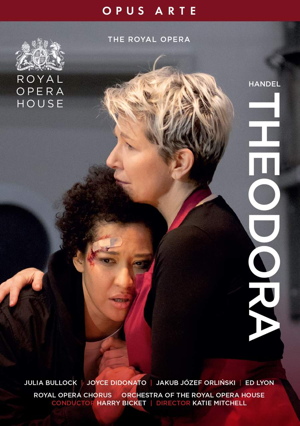
George Frideric Handel (1685-1759)
Theodora, oratorio in three acts (1750)
Theodora: Julia Bullock
Irene: Joyce DiDonato
Didymus: Jakub Józef Orliński
Septimius: Ed Lyon
Valens: Gyula Orendt
Marcus: Thando Mjandana
The Orchestra of the Royal Opera House and Royal Opera Chorus/Harry Bicket
Katie Mitchell (stage direction)
rec. live, 7 & 12 February 2022, Royal Opera House, Covent Garden, London
Opus Arte OA1368D DVD [189]
Handel wrote Theodora for the Covent Garden Theatre. After three performances, it had to wait 272 years for the fourth appearance in Covent Garden, the premiere of this production. It is not an opera, but Handel’s oratorios can often be staged: they contain duets, choruses, plots and named characters with different voice types, and they have English texts. On the other hand, his operas are in Italian, and often seem to be well over three hours of mainly da capo arias, mostly for high voice.
Theodora, with a book by Thomas Morrell, was Handel’s favourite among his oratorios. The work’s tone is very contemplative, and – in the authoritative opinion of Winton Dean (Handel’s Oratorios and Masques, OUP 1959, Chapter 25) – it will not be rushed. Dean notes: “Act 1 is long and diffuse. Eight out of ten airs have the full da capo, and although the leisurely pace of the action might be pleaded in justification, the effect in modern performance is wearisome.” He says about the tempo indications: “The direction Largo or Larghetto occurs in exactly half of the forty-two movements of Theodora.”
Katie Mitchell’s production seems to want to correct for this lassitude. As the DVD case tells us (presumably citing the Director), she sets the work in “an alternative modern day reality. Theodora, a religious fundamentalist, plots for the resistance against the Roman occupation. But when her secret plan to destroy the Roman embassy is discovered, she learns the true brutality of her oppressors. […] This […] shines a new feminist light on the story.” There also is the warning, which I duly pass on: “This production depicts explicit violence and sexual harassment, scenes of sexual violence and sexual exploitation, and contains themes of terrorism.”
In this setting, then, Theodora, Irene and the Christians are staff in the kitchen of the Antioch Roman Embassy. They covertly assemble a bomb. Theodora certainly is a fatalist here: one has to wait for Isolde to encounter an equally death-seeking female title role in opera. The bomb is discovered and defused, Theodora (as usual) pleads for death but is instead condemned to be a prostitute (which is in the score). What the libretto calls her cell is staged here as a brothel, with an especially lurid shade of what one might call bordello red. Theodora is raped and Irene beaten up. Valens, the Governor of Antioch, likes to keep his centrefold playmates and his goons with guns nearby, whatever the scene.
In Handel’s work, our heroine happily goes to execution and heaven with her beloved rescuer Didymus. In this version, she is locked in the Embassy’s freezer room, whence she is rescued by Irene, obtains a handgun and kills her rapist and Governor Valens, all to slo-mo, while we hear the final sublime chorus “O love divine”. Such disjunctions between what we see and what we hear are inevitable when any opera is reset so radically. Theodora in the brothel sings an air, flanked by a pair of fellow sex-workers pole-dancing – but not to the type of music which usually accompanies such activities, or so I imagine. It is easy to poke fun at a bold attempt to remake a great score for the stage. This production has its moments but overall there is a tension between the spiritual character of the work and the staging. I am not sure how many buyers would enjoy repeat viewings, which is one point of a recording.
Even so, soloists of the calibre of Julia Bullock, Joyce DiDonato and Jakub Józef Orliński offer many compensations. The three sound like exemplary exponents of Baroque singing. They have attractive tone, agility in swift passages, and superb control in those Largos and Larghettos. They also act out the demanding parts Katie Mitchell requires of them, fully committed to her radical vision.
Bullock’s Theodora is clearly comfortable with bombs and handguns. DiDonato seems quite unfazed by spending the rest of the evening with the facial bruises and cuts from the beating her character takes in Act 1. Orliński is a fine Handelian too. His English is not perfect, but that is no distraction when the sound is so alluring, the line so supple. His Didymus is most affecting in the Streams of Pleasure air towards the close of the last act. The pleasure doubles when Bullock joins him for their closing duet Thither let our hearts aspire.
Gyula Orendt’s Valens is a misogynistic brute, but he sings rather than snarls, thank goodness, for he serves his small but significant part well. Ed Lyons, a sympathetic and noble-toned Septimius, sings with real flair, especially in some very athletic melismatic passages. Harry Bickett conducts the excellent ROH orchestra and the fine chorus with great feeling for the score, and never lets the slower tempi sag, for which his singers, solo and choral, show plenty of vocal gratitude. The booklet is the usual minimal affair (English only). There is good sound and very effective filming.
Roy Westbrook
Help us financially by purchasing from



Other production staff
Set designer: Chloe Lamford
Costume designer: Sussie Juhlin-Wallén
Lighting designer: James Farncombe
Movement director: Sarita Piotrowski
Screen director: Peter Jones
Video details
Sound: Dolby Digital Stereo + Dolby Digital Surround 5.1
Subtitles: English, French, German, Japanese, Korean


















